LGBTQ+ History Month
February is LGBTQ+ history month where we recognise the contributions of our LGBT+ communities—find out how we are celebrating
LGBTQ+ History Month is an important annual event recognising the history of LGBTQ+ civil rights movements, celebrating how far we have come in the fight for LGBTQ+ equality, and reflecting on the discrimination that many people in the UK and around the world still face today for their sexual orientation or gender identity.
LGBTQ+ History Month 2025 is marking its 20th anniversary, and this year’s theme is Activism and Social Change. This aims to celebrate LGBT+ people who have been activists and helped shape and create social change, advancing society for everyone.
There are many different approaches to activism:
- Protests and rallies
- Campaigns – letter writing and social media
- Boycotts and direct action
- Collaboration and education
- Art and music
- Literature and poetry
- Theatre, film, comedy and dance
- Crafts from banners to zines
- Living openly
For more information about the theme, including resources for the month, visit the schools out page.
Spotlighting our staff
We are spotlighting members at the Trust who demonstrate activism both within and outside their roles.
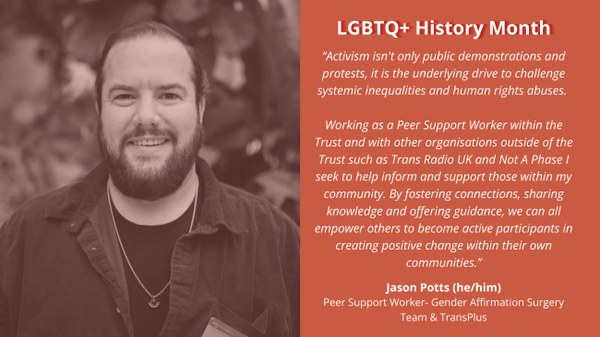
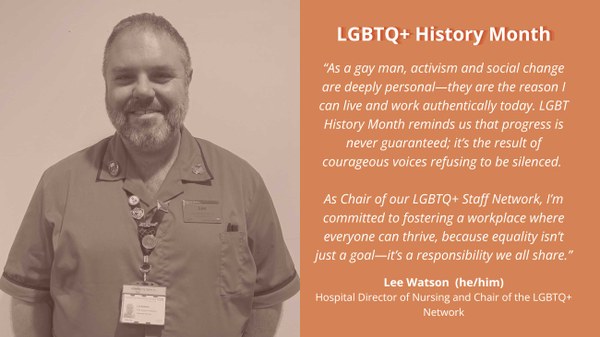
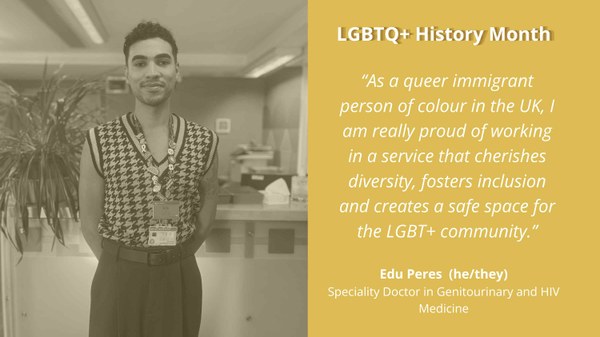
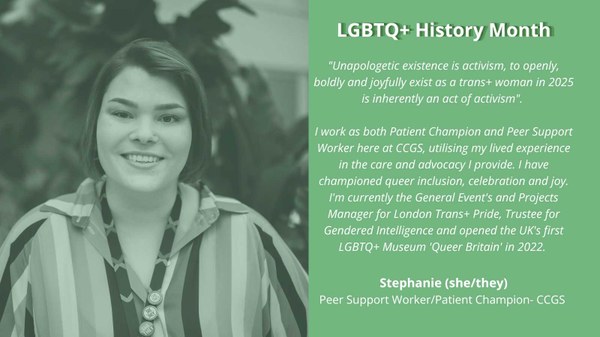
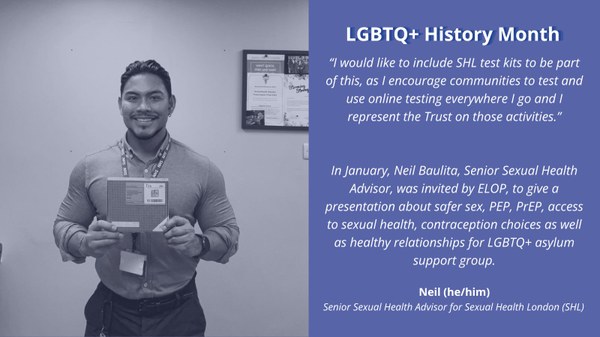
Our History: Staff and Clinics
Dr Adam Lawrence
Dr Lawrence was appointed to St Stephen’s Hospital in 1972 as the first consultant in Genito-Urinary Medicine where he established a new Genito-Urinary service. Subsequently, this service was well placed to respond to the emerging HIV epidemic and Dr Lawrence soon became at the forefront of developing services for people with HIV and AIDS. By 1977, he had attracted so many patients to the clinics based at St Stephen’s Hospital, a full-time clinic called the John Hunter clinic was opened in May 1980.
However, from the outset this service grew and was quickly overstretched even before the recognition, in 1981, of the immune deficiency syndrome subsequently known as AIDS, then HIV disease. He referred a patient, who had developed a wasting syndrome, to Brian Gazzard in 1980. This was recognised as one of the earliest cases of AIDS in London.
Adam Lawrence developed and fostered extensive clinical liaisons with colleagues in other specialties to manage the complications not only of HIV but also other sexually transmitted diseases. He, along with colleagues, embraced the changes required to cope with a rapidly evolving specialty. This continued over time leading to St Stephens and then Chelsea and Westminster Hospital becoming a major centre for managing HIV and all aspects of sexual health.
A counselling room in the John Hunter Clinic—the Lawrence Room—was named after him in his honour. Dr Lawrence passed away in November 2022, leaving behind a legacy of major importance to the development of HIV and sexual health services in London.
Dr Simon Mansfield
Dr Simon Mansfield was appointed as the UK’s first Consultant in community HIV medicine in 1990. He devoted himself to achieving a seamless service between the hospital and the statutory and voluntary sectors providing community are. He was a tenacious fighter of patient’s rights and for better facilities and care for people with HIV infection.
He was passionately committed to HIV prevention work, initially though the Gay Men’s Health Education Group at the Terrence Higgins Trust and subsequently as a founder member of Gay Men Fighting AIDS.
Dr Mansfield lived courageously with the same infection as his patients and passed away in April 1993. His pioneering contribution to the development of services for people with HIV continues to be valued and recognised today.
A meeting and training room in the St Stephens Centre —the Simon Mansfield Room —was named after him in his honour.
Dr Brian Gazzard
Dr Brian Gazzard joined Westminster and St Stephen's Hospital as a consultant in 1978. His main interest was the pathogenesis pf cancer of the colon but shortly after his arrival, Adam Lawrence referred to him one of the first patients in the UK with AIDS. The subsequent rapid increase of the St Stephens Centre was facilitated by Gazzard and other General Managers who allowed Infectious Diseases and Private Patients wing to be used for the care of patients with HIV.
The rapidly increasing epidemic led Dr Gazzard to change from being a Gastroenterologist to a physician interested in the treatment of immune deficiency. He was the Clinical Director of this unit until 1996 but continued as Research Clinical Director for many years after. He was also the founding Chair of the British HIV Association (BHIVA) and the Chair of the Department of Health’s Expert Advisory Group on AIDS. In 2011, Gazzard was awarded CBE for services to healthcare in the Queen's Birthday Honours.
The Gazzard Day Unit was named in his honour; a ward dedicated to chemotherapy patients.
The Kobler Clinic
The Kobler clinic was first opened on 13th September 1988 by Diana, Princess of Wales. It was the first NHS service designed specifically for HIV patients.
It is named after Fred Kobler, a Czech-born architect, who following his death in 1987, left an estate worth in excess of £2,750,000. This money was used to create the Kobler Trust that supports worthy and diverse causes, including founding the Kobler outpatient clinic for HIV sufferers.
The Kobler Centre is currently based within the St Stephens Centre on Fulham Road and 35 years later is the largest specialist HIV Unit in Europe, seeing approximately 5000 patients.
Today, our HIV team are still leading the way in HIV care and innovation with their pioneering work in digital solutions. First introduced as a pilot in Kobler clinic in 2018, Klick is a pathway of care for people living with HIV based around an app which allows patients to book and reschedule appointments remotely as well as request medication and receive messages from healthcare professionals.
John Hunter Clinic (JHC)
The JHC is a sexual health clinic located within the St Stephen’s Centre and offers on-the-day booked sexual health appointments and specialist services. The JHC opened in 1980 at St Stephens Hospital and soon attracted over 10,000 attendances a year.
It was named after John Hunter, a pioneering 18th century surgeon who made important contributions to the early research into venereal disease. He was a local man who had a 40-acre zoo in Earl’s Court village where he undertook research into comparative anatomy.
The clinic had many innovative features including a mixed, pleasant waiting room and music. Patients were called by their first name- a practice that preserved confidentiality as well as enhancing the informality of the service.
The Gazzard Day Unit
The Gazzard Day Unit (GDU) is located in Ron Johnson Ward provides joint care with oncology, day case treatments and rapid review to those who are acutely unwell. It is also the area dedicated for chemotherapy patients.
The Gazzard Day Unit is named after internationally renowned HIV expert Prof Brian Gazzard who worked as a gastroenterologist and general physician at the Trust. Not only was he instrumental in establishing the HIV unit in 1987 but he also saw one of the first cases of HIV disease in Europe in 1981. In 2011 Brian was awarded a CBE for services in healthcare.
The Ron Johnson Ward
The Ron Johnson Ward, named after a patient who was treated by Dr Brian Gazzard and who kindly donated funds, opened in 2012 and replaced the existing Thomas Macaulay Ward and Kobler Day Care for HIV patients. It incorporates oncology and haematology services, meaning all chemotherapy and other anti-cancer therapies for outpatients is provided in one place.
Prior to its opening, the Thomas Macaulay Ward, named after the Charge Nurse, was established in 1980s and was dedicated for people living with HIV/AIDS. It even had its own endoscopy suite. Its philosophy was to maximise patient independence; an ethos that is still followed to this day.
In 2016, Imperial College Healthcare Trust and Chelsea and Westminster Hospital NHS Foundation Trust merged their inpatient services for people living with HIV in the Ron Johnson Ward, maintaining specialist HIV and oncology expertise for more than 16,000 people


